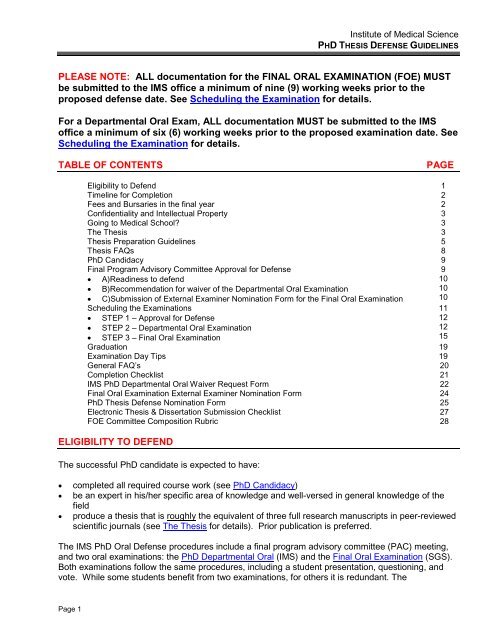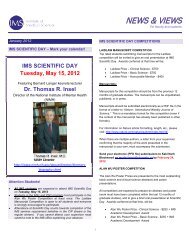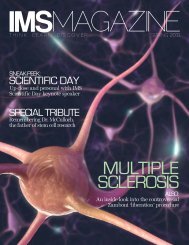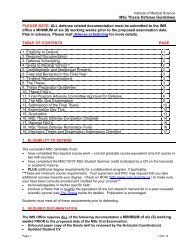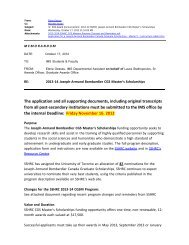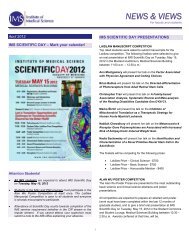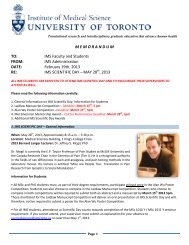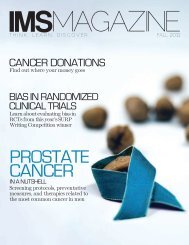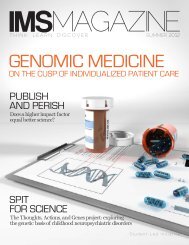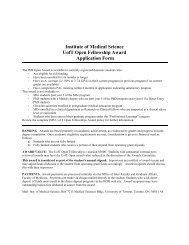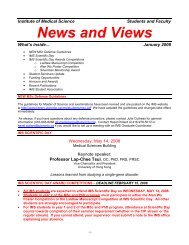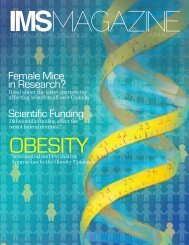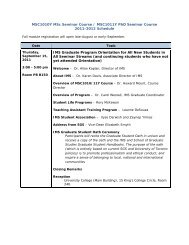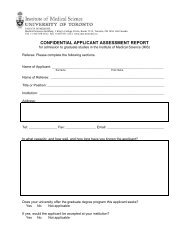PhD Examination Guidelines - Institute of Medical Science
PhD Examination Guidelines - Institute of Medical Science
PhD Examination Guidelines - Institute of Medical Science
Create successful ePaper yourself
Turn your PDF publications into a flip-book with our unique Google optimized e-Paper software.
<strong>Institute</strong> <strong>of</strong> <strong>Medical</strong> <strong>Science</strong><br />
PHD THESIS DEFENSE GUIDELINES<br />
PLEASE NOTE: ALL documentation for the FINAL ORAL EXAMINATION (FOE) MUST<br />
be submitted to the IMS <strong>of</strong>fice a minimum <strong>of</strong> nine (9) working weeks prior to the<br />
proposed defense date. See Scheduling the <strong>Examination</strong> for details.<br />
For a Departmental Oral Exam, ALL documentation MUST be submitted to the IMS<br />
<strong>of</strong>fice a minimum <strong>of</strong> six (6) working weeks prior to the proposed examination date. See<br />
Scheduling the <strong>Examination</strong> for details.<br />
TABLE OF CONTENTS<br />
PAGE<br />
Eligibility to Defend 1<br />
Timeline for Completion 2<br />
Fees and Bursaries in the final year 2<br />
Confidentiality and Intellectual Property 3<br />
Going to <strong>Medical</strong> School? 3<br />
The Thesis<br />
3<br />
Thesis Preparation <strong>Guidelines</strong><br />
5<br />
Thesis FAQs<br />
8<br />
<strong>PhD</strong> Candidacy 9<br />
Final Program Advisory Committee Approval for Defense<br />
• A)Readiness to defend<br />
• B)Recommendation for waiver <strong>of</strong> the Departmental Oral <strong>Examination</strong><br />
• C)Submission <strong>of</strong> External Examiner Nomination Form for the Final Oral <strong>Examination</strong><br />
Scheduling the <strong>Examination</strong>s<br />
11<br />
• STEP 1 – Approval for Defense<br />
12<br />
• STEP 2 – Departmental Oral <strong>Examination</strong><br />
12<br />
• STEP 3 – Final Oral <strong>Examination</strong><br />
15<br />
Graduation 19<br />
<strong>Examination</strong> Day Tips<br />
General FAQ’s<br />
19<br />
20<br />
Completion Checklist 21<br />
IMS <strong>PhD</strong> Departmental Oral Waiver Request Form 22<br />
Final Oral <strong>Examination</strong> External Examiner Nomination Form 24<br />
<strong>PhD</strong> Thesis Defense Nomination Form<br />
Electronic Thesis & Dissertation Submission Checklist<br />
FOE Committee Composition Rubric<br />
ELIGIBILITY TO DEFEND<br />
The successful <strong>PhD</strong> candidate is expected to have:<br />
• completed all required course work (see <strong>PhD</strong> Candidacy)<br />
• be an expert in his/her specific area <strong>of</strong> knowledge and well-versed in general knowledge <strong>of</strong> the<br />
field<br />
• produce a thesis that is roughly the equivalent <strong>of</strong> three full research manuscripts in peer-reviewed<br />
scientific journals (see The Thesis for details). Prior publication is preferred.<br />
The IMS <strong>PhD</strong> Oral Defense procedures include a final program advisory committee (PAC) meeting,<br />
and two oral examinations: the <strong>PhD</strong> Departmental Oral (IMS) and the Final Oral <strong>Examination</strong> (SGS).<br />
Both examinations follow the same procedures, including a student presentation, questioning, and<br />
vote. While some students benefit from two examinations, for others it is redundant. The<br />
9<br />
10<br />
10<br />
10<br />
25<br />
27<br />
28<br />
Page 1
<strong>Institute</strong> <strong>of</strong> <strong>Medical</strong> <strong>Science</strong><br />
PHD THESIS DEFENSE GUIDELINES<br />
Departmental Oral can be waived upon request (final approval <strong>of</strong> the waiver is at the discretion <strong>of</strong> the<br />
Graduate Coordinators).<br />
TIMELINE FOR COMPLETION<br />
A timeline for degree completion is available on the IMS website at:<br />
http://www.ims.utoronto.ca/current/degree/timeline.htm<br />
Writing up and defending your <strong>PhD</strong> thesis takes an AVERAGE <strong>of</strong> 7-12 months (3-4 months for<br />
writing, 1-3 months for thesis pro<strong>of</strong>ing, review, and 3-5 months for the examination process). To<br />
ensure timely completion, students should:<br />
• Review the <strong>PhD</strong> defense guidelines prior to starting to write the thesis<br />
• Discuss the process with the Supervisor and PAC members as early as possible<br />
• Complete course requirements early in the program<br />
• Send regular thesis drafts to supervisor and PAC committee to review and set deadlines for return<br />
<strong>of</strong> comments. Allow at least one month for review <strong>of</strong> the final thesis draft by the PAC members<br />
• Book all meetings WELL in advance<br />
• Avoid peak examination periods if possible (August, September, December, January)<br />
• Review the Completion Checklist attached to these guidelines<br />
• Meet with the Graduate Coordinator if there are any concerns about the defense<br />
FEES AND BURSARIES IN THE FINAL YEAR<br />
Fees in your final year are levied on a monthly basis. Fees will be charged until the end <strong>of</strong> the<br />
month after you have handed in your final thesis to the <strong>PhD</strong> Orals Office. Contact the Student<br />
Accounts Office to discuss payment.<br />
Student Accounts Office Contact Info: www.fees.utoronto.ca<br />
416-978-2142<br />
You have THREE OPTIONS FOR FEE PAYMENT in the final year <strong>of</strong> study:<br />
1. Pay full year fees up front and get a rebate <strong>of</strong> the portion <strong>of</strong> unused fees (i.e. pay fees in<br />
September, complete in April and get a 5 month fee rebate)<br />
2. Pay one term <strong>of</strong> fees up front and get a rebate <strong>of</strong> the unused fees portion (i.e. pay fees in<br />
September, complete in November and get a 2 month rebate)<br />
3. Pay fees pro-rated on a monthly basis<br />
Candidates are required to pay outstanding University fees before the Final Oral <strong>Examination</strong>.<br />
For comprehensive information on fees in your final year, visit: www.sgs.utoronto.ca > Information for<br />
Students > Money Matters > Graduate Fees.<br />
Apply for a Doctoral Thesis Completion Grant: <strong>PhD</strong> students in year 5 or 6 may apply for a<br />
Doctoral Thesis Completion Grant. Information and forms are available on the SGS web site at<br />
http://www.sgs.utoronto.ca/informationfor/students/money/support/PDF.htm. You are only allowed<br />
one such grant during your degree.<br />
Page 2
<strong>Institute</strong> <strong>of</strong> <strong>Medical</strong> <strong>Science</strong><br />
PHD THESIS DEFENSE GUIDELINES<br />
CONFIDENTIALITY AND INTELLECTUAL PROPERTY<br />
Make an appointment with the IMS Graduate Coordinator IMMEDIATELY if your student stipend is<br />
derived from a contract or your research project is associated with an industrial contract. Industrial<br />
support <strong>of</strong> research may limit the communication <strong>of</strong> research findings. This may affect your thesis<br />
and degree defense. <strong>Guidelines</strong> for Faculty <strong>of</strong> Medicine Graduate Students and Supervisors in the<br />
Context <strong>of</strong> Commercialization <strong>of</strong> Inventions based on Thesis-Related Research is available here.<br />
GOING TO MEDICAL SCHOOL? Plan Ahead!<br />
We recommend that you complete your IMS degree, and then enter medical school. Most<br />
<strong>Medical</strong> Schools demand degree completion BEFORE starting <strong>Medical</strong> School. Offers <strong>of</strong><br />
admission are issued up to the start <strong>of</strong> <strong>Medical</strong> School classes. Plan to defend by mid-June.<br />
• Discuss the issue with your Supervisor and Program Advisory Committee when you apply to<br />
medical school<br />
• Meet with your committee <strong>of</strong>ten to ensure you all agree on a timeline for completion and work<br />
expectations<br />
• Confirm with your medical school(s):<br />
• Does admission demand degree completion prior to entry?<br />
• If yes, what is their final deadline for submission <strong>of</strong> degree?<br />
• What is the final date when you’ll hear about your acceptance?<br />
• Get all research for your degree completed WELL IN ADVANCE<br />
• Book your defense early. Defend your thesis by mid-June<br />
THE THESIS<br />
The supervisor and Program Advisory Committee are responsible for guiding the student about thesis<br />
content and research completion. Supervisor and Committee should ensure that they are prompt in<br />
reviewing, correcting, and editing thesis drafts. Make sure that your supervisor and Program Advisory<br />
Committee review each part <strong>of</strong> your thesis as you write. This process will help you to make<br />
corrections and changes early and help you to maintain continuity throughout the writing process.<br />
Peer-reviewed publication is recommended.<br />
The research content <strong>of</strong> a <strong>PhD</strong> thesis is roughly the equivalent <strong>of</strong> three full research<br />
manuscripts in peer-reviewed scientific journals. This varies by discipline. Some research<br />
consists <strong>of</strong> one large study (i.e. a clinical trial) that may result in one major publication; other research<br />
programs may generate the equivalent <strong>of</strong> several publications. You are expected to be an expert in<br />
your specific area <strong>of</strong> knowledge. Thesis work will reflect an original contribution to new knowledge,<br />
and the candidate should have demonstrated an appropriate level <strong>of</strong> scholarship in his/her chosen<br />
field.<br />
Before writing your thesis…<br />
• Meet briefly with a Graduate Coordinator<br />
• Obtain SGS guidelines for the preparation, formatting and binding <strong>of</strong> the thesis here. Pay<br />
particular attention to the formatting, copyright instructions, and the required forms (see Electronic<br />
Thesis Preparation and Submission)<br />
• Obtain the necessary forms that will accompany your final thesis here.<br />
• Doctoral Authority to Distribute<br />
Page 3
<strong>Institute</strong> <strong>of</strong> <strong>Medical</strong> <strong>Science</strong><br />
PHD THESIS DEFENSE GUIDELINES<br />
• UMI Subject Categories<br />
• Library and Archives Canada Theses Non-Exclusive License<br />
• Consult the format <strong>of</strong> previously completed theses in the IMS thesis reference library or U<strong>of</strong>T<br />
library (call the IMS Office first to make sure the IMS thesis reference library is available). You<br />
can view theses on line at Theses Canada at http://www.nlc-bnc.ca/thesescanada/<br />
Electronic Thesis Preparation and Submission<br />
Doctoral student must submit the final version <strong>of</strong> their thesis to SGS in electronic form. Although only<br />
the FINAL, APPROVED THESIS (after the Final Oral <strong>Examination</strong>) is submitted electronically, we<br />
recommend that students prepare their thesis according to SGS directions for ultimate electronic<br />
submission.<br />
Electronic theses and dissertation (ETD) instructions and templates are available through the ETD<br />
website at: http://www.sgs.utoronto.ca/informationfor/students/finup/producingthesis/t-space.htm<br />
SGS recommends that you use their style templates (available in Micros<strong>of</strong>t Word or Latex) to create a<br />
ONE-FILE thesis. This would then be converted to and submitted in PDF as a single file complying<br />
with the SGS <strong>Guidelines</strong> for thesis format. Students may submit additional supplementary files (e.g.<br />
high resolution images, sound files, and video) to T-Space; these will be linked electronically to the<br />
main thesis. Files are submitted through a self-submission process complete with vetting procedures<br />
and web input forms that allow documents to be uploaded into a repository. The digital copy <strong>of</strong> the<br />
ETD in the institutional repository will be considered the “<strong>of</strong>ficial” version <strong>of</strong> the thesis. Each ETD will<br />
be assigned a permanent URL - a URL that will not change - thus ensuring reliable access to the<br />
digital version.<br />
Final theses are housed in “T-Space”, the institutional research repository for the University <strong>of</strong><br />
Toronto community (see https://tspace.library.utoronto.ca/ ). ETDs will normally be released 2-weeks<br />
after the student has graduated; release may be delayed however for the same time periods and<br />
following the same procedure as for paper copies. For Phase One, ETDs will be sent to ProQuest for<br />
conversion to micr<strong>of</strong>iche, citation in Dissertation Abstracts International, and transmission to Library<br />
and Archives Canada, as are paper copies.<br />
A web site, style templates (Word and Latex) and workshops have been developed to assist students<br />
with the production and submission <strong>of</strong> ETDs. Adobe Acrobat will be required to complete the PDF<br />
conversion (available inexpensively through the U <strong>of</strong> T site licensing at<br />
http://www.utoronto.ca/ic/s<strong>of</strong>tware/detail/adobepro.html#student ) A computer in the Information<br />
Commons equipped with this s<strong>of</strong>tware has been designated as an ETD workstation and the Help<br />
Desk at Information Commons is available to respond to technical enquiries.<br />
Contributions <strong>of</strong> Others To Your Project…<br />
Discuss this with your supervisor. Acknowledge others properly in the thesis, but be ready to defend<br />
work by others used in your thesis. Clearly state your own contribution in the thesis.<br />
Research Included in <strong>PhD</strong> thesis…<br />
Your <strong>PhD</strong> thesis should only be composed <strong>of</strong> work acquired while enrolled in the <strong>PhD</strong> program. It<br />
should not include work acquired during previous degrees or employment.<br />
Multiple Publications Generated During Your Research…<br />
If they are related to your main hypothesis, you may present them as separate chapters in the thesis.<br />
If they are not directly related to your main research, you may add it as an appendix in the thesis.<br />
However, be ready to answer questions raised from such work. Two commonly used formats are:<br />
Page 4
<strong>Institute</strong> <strong>of</strong> <strong>Medical</strong> <strong>Science</strong><br />
PHD THESIS DEFENSE GUIDELINES<br />
• If the methods are similar, put them together, then present results as separate chapters<br />
• If different methods are used, eliminate the Methods chapter and present methods in separate<br />
chapters<br />
Which comes first? Publication <strong>of</strong> the research or defense <strong>of</strong> the thesis?<br />
Talk to your supervisor about this and come to an agreement early on in your program. Your<br />
supervisor has a vested interest in prompt publication. You have an interest in a quick degree<br />
completion. Book an appointment with the graduate coordinators if there is disagreement over this.<br />
Appointments can be requested by phone at 416-978-5012.<br />
THESIS PREPARATION GUIDELINES<br />
Detailed guidelines on the technical aspects <strong>of</strong> thesis preparation and formatting can be found online<br />
at: http://www.sgs.utoronto.ca/informationfor/students/finup/producingthesis.htm<br />
Beginning in September, 2009, SGS requires that all theses be deposited electronically as PDF files.<br />
Note that IMS will continue to require a bound paper copy <strong>of</strong> your thesis before you convocate, for our<br />
thesis reference library.<br />
Format<br />
Your thesis may be prepared in a continuous “traditional format”, with:<br />
• in depth Literature Review,<br />
• Aims/Hypotheses<br />
• detailed Methods section<br />
• data presented in a central Results section<br />
• a Discussion that describes the plausible range <strong>of</strong> interpretations for your work<br />
• Conclusions and Future Directions<br />
Alternatively, you may choose a "paper format". In this case, your thesis work is organized as a<br />
series <strong>of</strong> self-contained chapters, each containing a focused:<br />
• Introduction<br />
• Methods<br />
• Results<br />
• Discussion/Conclusion<br />
• Literature Review<br />
• Aims/Hypotheses<br />
• General Discussion<br />
• Conclusions<br />
• Future Directions chapters<br />
The decision as to which format to use is best made early in the writing process, in consultation with<br />
your supervisor. In general, the choice depends upon the stage you are at in the preparation <strong>of</strong><br />
publications and whether your thesis is most readily viewed as one continuous work or a set <strong>of</strong><br />
related studies that together tell your story. Bring in your proposed Table <strong>of</strong> Contents and the<br />
Graduate Coordinators will be glad to look it over.<br />
Abstract<br />
The central hypothesis, rationale and research aims should be clearly and explicitly laid out, along<br />
Page 5
<strong>Institute</strong> <strong>of</strong> <strong>Medical</strong> <strong>Science</strong><br />
PHD THESIS DEFENSE GUIDELINES<br />
with interpretation <strong>of</strong> the results for each component <strong>of</strong> your experimental work. State what you have<br />
found rather than “results will be discussed.” Keep technical jargon and discussion <strong>of</strong> background to a<br />
minimum. Endeavour to explain the findings and their significance at a level that is understandable to<br />
someone working outside your field <strong>of</strong> interest. A doctoral thesis abstract cannot exceed 350 words.<br />
Acknowledgments and Contributions<br />
Explicitly acknowledge the contributions <strong>of</strong> technicians, trainees, collaborators, faculty mentors and<br />
funding sources to the experimental work, analyses and writing <strong>of</strong> the thesis. Be precise, inclusive<br />
and accurate. Personal thanks to friends and family may also be included. A listing <strong>of</strong> the specific<br />
contributions <strong>of</strong> others is sometimes presented as a separate section immediately following<br />
Acknowledgments. Images, data and text taken, or adapted from material on the web, papers, or<br />
books, require attribution and cannot be used without permission from the copyright owner. Be sure<br />
to include formal letters <strong>of</strong> permission to incorporate any published materials in your thesis. More<br />
information on copyright issues and a template for preparing copyright letters <strong>of</strong> permission are<br />
available online from the SGS website at:<br />
http://www.sgs.utoronto.ca/informationfor/students/finup/producingthesis/copyrt.htm<br />
List <strong>of</strong> Abbreviations<br />
All but universally accepted abbreviations, such as units <strong>of</strong> measure, should be listed and should be<br />
explained in the thesis text on the page where they are first used. For guidance on what<br />
abbreviations need not be listed, consult the Council <strong>of</strong> <strong>Science</strong> Editors Manual for Authors, Editors,<br />
and Publishers (available through the U<strong>of</strong>T Gerstein Library, or for purchase at<br />
http://www.councilscienceeditors.org), for the instructions to authors provided by respected journals in<br />
your discipline.<br />
List <strong>of</strong> Figures and List <strong>of</strong> Tables<br />
Figure titles should be short and self-explanatory. Leave details to the legends. All figures require a<br />
legend. Remember to include error bars. By skimming the figures and legends, a reviewer should get<br />
a clear sense <strong>of</strong> the results in your thesis.<br />
Literature Review<br />
The Literature Review is a scholarly review <strong>of</strong> the background to your research question. It frames<br />
your work with reference to the history <strong>of</strong> your research question, relevant theories and the clinical<br />
picture, if appropriate. Concepts and terminology that are used in your research should be explained<br />
and you should provide a review <strong>of</strong> technologies, approaches and analytical methods that you use.<br />
Where there are gaps in the literature that your thesis addresses, point these out and mention how<br />
your thesis work will resolve them. The relevant literature should all be covered in this first section so<br />
that the Discussion need not introduce new literature (unless it is extremely recent).<br />
Research Aims and Hypotheses<br />
Strive for clarity. Research aims frame the general over-riding purpose <strong>of</strong> the project. Hypotheses<br />
are testable postulates about the nature <strong>of</strong> relationships in your field <strong>of</strong> study. State hypotheses<br />
explicitly and summarize the arguments behind them. For most theses, specific research questions<br />
are a series <strong>of</strong> experimental steps you take to test the hypotheses. Make sure that research aims,<br />
hypotheses and specific research questions are clearly aligned. In qualitative research theses, aims,<br />
hypotheses and key issues <strong>of</strong> research design typically emerge only through engagement in the field<br />
Page 6
<strong>Institute</strong> <strong>of</strong> <strong>Medical</strong> <strong>Science</strong><br />
PHD THESIS DEFENSE GUIDELINES<br />
<strong>of</strong> study. Differences between hypothesis-driven investigation and qualitative research can give rise<br />
to confusion, and particularly so when mixed method approaches are used. If in doubt, students<br />
should consult with the PAC for guidance on appropriate framing <strong>of</strong> the thesis research aims and<br />
structure, early in the writing process.<br />
Methods<br />
These should be described in sufficient detail as to allow someone else to reproduce your work. If a<br />
novel technique is described, this section should be quite extensive. If the thesis is prepared in a<br />
paper format, a consolidated General Methods section can be used to provide the necessary detail.<br />
Very fine detail (e.g. chemical recipes) can be placed in an Appendix.<br />
Results<br />
If you are preparing a paper format thesis, simply follow instructions to authors and norms common to<br />
respected journals in your field for each chapter <strong>of</strong> your experimental work. If you are using the<br />
traditional format, you may find that it useful to provide more interpretation <strong>of</strong> the results than you<br />
would in a shorter manuscript. This will help lead the reader through this extended section.<br />
Subheadings that indicate the "bottom line" for each set <strong>of</strong> related experiments are useful in the paper<br />
format and essential in a traditional Results section.<br />
Discussion<br />
A General Discussion is required in both traditional and paper format theses. In the paper format,<br />
discussion sections within individual chapters deal with results germane to experiments described in<br />
each chapter. In contrast, the General Discussion addresses the thesis as a whole. A bit <strong>of</strong><br />
repetition is inevitable. However, the depth <strong>of</strong> analysis in this section goes beyond your specific<br />
experiments and findings. This section should address the broader issues raised by your work. In<br />
the General Discussion, you need to discuss how the discrete parts <strong>of</strong> your work fit together.<br />
Explicitly discuss the hypotheses, how your work has supported them and in what ways it has not.<br />
Were your aims realistic? If not, why not? What were the limitations <strong>of</strong> your approach? What has<br />
your work revealed that is novel? How is it novel? Does it conform or not to the literature in your field<br />
(the literature you have covered in your literature review)? In a traditional thesis, the single<br />
Discussion section covers both the interpretation <strong>of</strong> particular experimental results and these larger,<br />
contextual issues.<br />
Conclusions<br />
This section should clearly state the "bottom line" <strong>of</strong> your findings, including a reappraisal <strong>of</strong> your<br />
hypotheses in light <strong>of</strong> your findings - i.e., whether your work supported or refuted your original<br />
hypotheses. This section can also speculate on the implication <strong>of</strong> your findings.<br />
Future Directions<br />
This is the fun part <strong>of</strong> your thesis! Where would you take this research program, were you to continue<br />
in the field over the next 6 months, 2 years, or 10 years? What are the most important questions that<br />
emerge from your work and review <strong>of</strong> the field? How would you address them?<br />
References<br />
Page 7
<strong>Institute</strong> <strong>of</strong> <strong>Medical</strong> <strong>Science</strong><br />
PHD THESIS DEFENSE GUIDELINES<br />
All references cited in the thesis and all published sources identified in the Contributions section must<br />
be listed. In general, cite primary sources whenever possible. If using a secondary source, make this<br />
clear (e.g. "reviewed in...."). You can use any one <strong>of</strong> the standard formats for references but be<br />
consistent in its use. Double-check to ensure that references in the list are cited in the text and,<br />
conversely, that all citations in the text are listed in the References section. Missing citations, or<br />
references are a red flag to reviewers.<br />
THESIS FAQs<br />
1. How long should my thesis be?<br />
A Ph.D. thesis runs 150 - 300 pages plus references. It includes:<br />
• A scholarly Literature Review (~50+ pages)<br />
• statement <strong>of</strong> Hypotheses and Research Aims, (2-5 pages) experimental work equivalent in<br />
depth to what would typically be contained in 3-4 peer-reviewed papers in substantive journals<br />
• General Discussion (20-50 pages) and Future Directions.<br />
Consult with your supervisor and PAC to ensure that you have adequately covered the background to<br />
your question, your results and their significance to the field. You may also find it helpful to discuss<br />
your outline and thesis plans with one <strong>of</strong> the Graduate Coordinators.<br />
2. English is not my native language. Does my thesis have to be written in perfect English?<br />
The grammar and spelling in your thesis must be <strong>of</strong> high standard, just as they would need to be in<br />
articles submitted for publication. Please ask your supervisor and your committee to advise you on<br />
language adequacy. Do not fall into the trap <strong>of</strong> taking verbatim passages from published papers or<br />
textbooks because you think they are written in “better English” than you can produce.<br />
The following University <strong>of</strong> Toronto resources are available to students to improve their academic<br />
writing and speaking skills:<br />
Office <strong>of</strong> English Language and Writing Support (ELWS)<br />
http://www.sgs.utoronto.ca/informationfor/students/english<br />
School <strong>of</strong> Graduate Studies Resources: Writing and Speaking<br />
http://www.sgs.utoronto.ca/informationfor/students/english/wrtspk.htm<br />
3. When does borrowing from the work <strong>of</strong> others become plagiarism?<br />
Under The Code <strong>of</strong> Behaviour on Academic Matters, to plagiarize is to “… knowingly represent as<br />
one’s own any idea or expression <strong>of</strong> an idea or work <strong>of</strong> another” in an academic work. It is critical<br />
that the ideas and arguments <strong>of</strong> others be correctly attributed and simply paraphrasing these as your<br />
own does not suffice. A more extensive discussion <strong>of</strong> the subject is provided in the guide “How Not to<br />
Plagiarize”( http://www.utoronto.ca/writing/plagsep.html), an excellent online resource prepared by Dr.<br />
Margaret Procter, U <strong>of</strong> T Coordinator, Writing Support.<br />
4. Can I actually plagiarize my own work !?<br />
It may seem surprising, but reproducing your own published work without proper acknowledgement<br />
can be considered “self-plagiarism”. If you include such materials in your thesis, cite the published<br />
work and submit a letter <strong>of</strong> permission from the copyright holder, or a statement from the publisher<br />
(<strong>of</strong>ten available on journal websites) authorizing use <strong>of</strong> the material, when you deposit your thesis.<br />
Page 8
<strong>Institute</strong> <strong>of</strong> <strong>Medical</strong> <strong>Science</strong><br />
PHD THESIS DEFENSE GUIDELINES<br />
5. Where else can I find guidance on what to include, organization and formatting?<br />
Take a minute to peruse the <strong>PhD</strong> and MSc theses <strong>of</strong> previous IMS students in the IMS thesis<br />
reference library. If available, look at the theses <strong>of</strong> students from your laboratory. The Table <strong>of</strong><br />
Contents will give you an idea <strong>of</strong> thesis structure. Skimming through several theses will give you a<br />
sense <strong>of</strong> what content and arguments should be covered in each section <strong>of</strong> your own text.<br />
<strong>PhD</strong> CANDIDACY<br />
By the end <strong>of</strong> year 3 <strong>of</strong> the <strong>PhD</strong> program, all <strong>PhD</strong> students are expected to have completed specific<br />
degree requirements, exclusive <strong>of</strong> thesis writing and defense. These are:<br />
Courses<br />
MSC 1011Y (indicated on the transcript or academic history with a CR upon completion)<br />
PLUS<br />
• For students with a MSc degree - One full graduate course equivalent<br />
• For <strong>PhD</strong> Direct Entry students or MSc students who transferred to the <strong>PhD</strong> program –Two full<br />
graduate course equivalents<br />
PLUS<br />
• Additional degree requirements for a collaborative program, if applicable. Check with your<br />
collaborative program administrator for specific requirements.<br />
These are minimum course requirements. Your supervisor and PAC may request that you take<br />
additional courses towards your degree. Check on ROSI (http://www.rosi.utoronto.ca ) to make<br />
absolutely sure you have been correctly enrolled and credited for your courses.<br />
• Regular PAC meetings – at least four PAC meetings must have been held and reports filed<br />
in the IMS <strong>of</strong>fice by the end <strong>of</strong> year 3 <strong>of</strong> the <strong>PhD</strong>.<br />
FINAL PROGRAM ADVISORY COMMITTEE (PAC) APPROVAL FOR DEFENSE<br />
When the supervisor and Program Advisory Committee have approved the written thesis, a final<br />
committee meeting is held with a FULL PRACTICE ORAL EXAMINATION to prepare the student for<br />
defense. The final PAC meeting will include a 20-minute slide presentation by the student, and a<br />
question period where committee members pose questions that would be typical <strong>of</strong> those asked<br />
during a final defense<br />
If the students intends on applying for a waiver <strong>of</strong> the IMS Departmental examination the IMS advises<br />
that an additional faculty member should participate in the final PAC meeting. The additional faculty<br />
member should, ideally, be a member <strong>of</strong> SGS, with supervisory experience, and be able to provide an<br />
objective perspective and feedback to the PAC and student.<br />
At the end <strong>of</strong> the meeting, the committee votes on the student’s readiness for defense, and SIGNS<br />
AND COMPLETES THE WAIVER REQUEST (if applicable) AND FINAL PAGE OF THE<br />
PROGRAM ADVISORY COMMITTEE FORM, indicating:<br />
(a) Readiness to Defend:<br />
Page 9
<strong>Institute</strong> <strong>of</strong> <strong>Medical</strong> <strong>Science</strong><br />
PHD THESIS DEFENSE GUIDELINES<br />
• The committee has reviewed the thesis. The student’s final thesis draft has been read and<br />
pro<strong>of</strong>ed by all committee members. It is acceptable, in terms <strong>of</strong> content, quality <strong>of</strong> writing,<br />
and presentation. The thesis is ready for presentation at a formal oral examination.<br />
• The committee has tested the student’s presentation and oral defense <strong>of</strong> work. The<br />
student’s presentation <strong>of</strong> the thesis was well-organized, comprehensive and focused. The<br />
student’s ability to field questions related to the background and significance <strong>of</strong> research,<br />
general knowledge, and specific issues related to the thesis has been appropriately tested.<br />
• The committee has tested the student’s general and specific knowledge related to<br />
research. The student has completed appropriate graduate courses for degree completion.<br />
The minimum degree requirements have been met. The student’s basic scientific<br />
knowledge has been appropriately tested and is acceptable for thesis defense<br />
(b) Recommendation for Waiver <strong>of</strong> the IMS Departmental Oral <strong>Examination</strong><br />
IMS <strong>PhD</strong> Oral Defense procedures include two oral examinations: the <strong>PhD</strong> Departmental Oral (IMS)<br />
and the Final Oral <strong>Examination</strong> (SGS). Both examinations follow the same procedures, including a<br />
student presentation, questioning, and final vote. A review <strong>of</strong> past examination outcomes has shown<br />
that while some students benefit from our current two-examination process, for others it is redundant.<br />
<strong>PhD</strong> candidates have the option <strong>of</strong> requesting a waiver <strong>of</strong> the IMS <strong>PhD</strong> Departmental Oral<br />
<strong>Examination</strong>. During the final PAC, the supervisor and program advisory committee must<br />
assess whether to request a waiver <strong>of</strong> the Departmental Oral <strong>Examination</strong> and check the<br />
appropriate box on the PAC form.<br />
If a <strong>PhD</strong> Oral <strong>Examination</strong> Waiver is requested, a <strong>PhD</strong> Oral <strong>Examination</strong> Waiver Request Form<br />
(completed by the supervisor and signed by the PAC), the student’s complete CV and thesis should<br />
be appended to the FINAL PAC form and submitted to the IMS Office.<br />
Approval <strong>of</strong> the request will be made by the IMS graduate coordinators, and will be dependent on a<br />
review <strong>of</strong> the waiver request, final PAC report, participation <strong>of</strong> an external faculty member at your final<br />
PAC, as well as grades, publications arising from graduate work, and public presentations. Decision<br />
on the request will be one <strong>of</strong> the following:<br />
• Approval <strong>of</strong> the departmental oral examination waiver. Usually requires prior publication <strong>of</strong><br />
a significant proportion <strong>of</strong> the thesis work and peer review <strong>of</strong> the bulk <strong>of</strong> experimental<br />
work.<br />
• Waiver <strong>of</strong> departmental oral examination denied. Student must complete two-tier<br />
examination process.<br />
Waivers are generally not approved by the IMS Graduate Coordinators if research involves issues <strong>of</strong><br />
conflict <strong>of</strong> interest, confidentiality, or intellectual property or if the student has lapsed for a significant<br />
period <strong>of</strong> time.<br />
Students who are uncertain <strong>of</strong> the potential eligibility to waive a Departmental Oral are encouraged to<br />
meet with the IMS Graduate Coordinators prior to arranging the final PAC meeting.<br />
(c) Submission <strong>of</strong> External Examiner Nomination Form for the Final Oral <strong>Examination</strong><br />
The Dean <strong>of</strong> Graduate Studies personally reviews and approves the External Examiner for the Final<br />
Oral <strong>Examination</strong>.<br />
Page 10
<strong>Institute</strong> <strong>of</strong> <strong>Medical</strong> <strong>Science</strong><br />
PHD THESIS DEFENSE GUIDELINES<br />
SGS mandates that an arm’s length relationship be maintained among candidate, supervisor,<br />
and External Examiner. Students may NOT contact the examiner. Supervisors may contact<br />
external examiners ONLY to ascertain willingness to provide a written appraisal, availability to<br />
attend the examination at the specified time and preference <strong>of</strong> thesis submission format.<br />
Supervisor and examiner DO NOT discuss thesis content, aside from providing the thesis title<br />
and sending the thesis.<br />
At the Final PAC meeting, committee, student, and supervisor should recommend three<br />
potential External Examiners for the Final Oral <strong>Examination</strong>.<br />
The external examiner must:<br />
• be a non-U<strong>of</strong>T expert in the candidate’s field <strong>of</strong> research<br />
• be affiliated with another University and hold pr<strong>of</strong>essorial rank equivalent to a Full Member <strong>of</strong><br />
SGS ( i.e eligible to supervise graduate students as a Pr<strong>of</strong>essor or Associate Pr<strong>of</strong>essor)<br />
• be an objective reviewer - neither affiliated with the student’s research project nor collaborated<br />
with the supervisor or student in the previous six years.<br />
The external examiner will be required to submit a written appraisal <strong>of</strong> the thesis at least two<br />
weeks before the Final Oral <strong>Examination</strong>. The External Examiner may attend the defense in<br />
person, participate via teleconference (voting member), or not attend at all (non-voting member). The<br />
IMS Office presents a $100 honorarium to external appraisers, and up to $500 in traveling expenses<br />
(upon submitting all original receipts to the IMS <strong>of</strong>fice). We encourage external appraiser’s to attend<br />
via teleconference.<br />
The IMS <strong>of</strong>fice will review the proposed examiners, obtain a copy <strong>of</strong> the external examiners’<br />
CV and forward it to the School <strong>of</strong> Graduate Studies for formal approval.<br />
SCHEDULING THE EXAMINATION(S)<br />
Scheduling a <strong>PhD</strong> Oral <strong>Examination</strong> is a complex process. We have set STRICT deadlines to ensure that your<br />
examination runs smoothly. Please read the complete examination guidelines thoroughly.<br />
This section <strong>of</strong> the <strong>PhD</strong> <strong>Examination</strong> <strong>Guidelines</strong> includes information on both the Departmental and Final Oral<br />
<strong>Examination</strong>s. Many students will successfully waive the Departmental Oral and proceed directly to the Final<br />
Oral <strong>Examination</strong>.<br />
When settling on a defense date and time with your committee, please note the following scheduling<br />
limitations:<br />
• The defense may start no earlier than 9am and no later than 3pm, Monday through Friday.<br />
• The defense may only take place on days that the university is open. Please visit the School <strong>of</strong><br />
Graduate Studies (SGS) sessional dates calendar for holidays and university closures :<br />
http://www.sgs.utoronto.ca/calendar.htm<br />
• In order to be eligible for the next round <strong>of</strong> convocation, students must defend a MINIMUM <strong>of</strong> one<br />
week prior to the final date for receipt <strong>of</strong> degree recommendations as listed in the SGS sessional<br />
dates calendar: http://www.sgs.utoronto.ca/calendar/2012-13.htm<br />
For example: If a student wishes to convocate in November, they must defend no later than Sept.<br />
28th (1 week prior to the degree recommendation deadline <strong>of</strong> Oct.5th). Please note that SGS<br />
sessional dates vary from year to year.<br />
• The University is closed for approximately 2 weeks during the winter holidays. These 2 weeks do<br />
not count toward the minimum 9 working weeks’ notice needed to schedule the defense.<br />
Page 11
<strong>Institute</strong> <strong>of</strong> <strong>Medical</strong> <strong>Science</strong><br />
PHD THESIS DEFENSE GUIDELINES<br />
• SGS does not allow <strong>PhD</strong> FOE’s typically one full week prior to the <strong>of</strong>ficial University closure date<br />
for the winter holidays. SGS also does not allow <strong>PhD</strong> FOE’s typically in the first 3 business days<br />
after the university <strong>of</strong>ficially opens in January. Students and faculty will receive an e-mail MEMO<br />
at the end <strong>of</strong> September, notifying them <strong>of</strong> these dates. Dates vary by year.<br />
STEP 1 – APPROVAL FOR DEFENSE<br />
• The IMS Office will review and file the final PAC Report. The final PAC form must be in the IMS<br />
Office prior to scheduling a defense.<br />
• Students wishing to waive the Departmental Exam can meet with the Graduate Coordinators prior<br />
to their Final PAC to discuss the waiver criteria.<br />
• The IMS Graduate Coordinators will review the <strong>PhD</strong> Oral <strong>Examination</strong> Waiver Request Form (if<br />
submitted) and decide whether to waive the Departmental Oral <strong>Examination</strong>. Waiver requests<br />
may require 1-2 weeks for processing, depending on the availability <strong>of</strong> the Graduate Coordinators.<br />
Student and supervisor will be informed via e-mail <strong>of</strong> the decision.<br />
STEP 2 – THE DEPARTMENTAL ORAL EXAMINATION<br />
The purpose <strong>of</strong> the Departmental Oral <strong>Examination</strong> is to closely review the thesis, recommend<br />
revisions to be made prior to the Final <strong>PhD</strong> Defense, and test the student’s knowledge <strong>of</strong> his/her field<br />
<strong>of</strong> study. The exam provides an objective analysis <strong>of</strong> the candidate’s thesis and background<br />
knowledge by faculty members <strong>of</strong> good standing, who are familiar with the standards <strong>of</strong> scholarship<br />
required by the School <strong>of</strong> Graduate Studies.<br />
If the Departmental Oral <strong>Examination</strong> has been waived, proceed to STEP 3 – The Final Oral<br />
<strong>Examination</strong><br />
The IMS Office requires ALL <strong>of</strong> the following documentation AT LEAST 6 WORKING WEEKS<br />
PRIOR to the proposed date <strong>of</strong> a <strong>PhD</strong> Departmental Oral <strong>Examination</strong>:<br />
• Unbound paper copy <strong>of</strong> the thesis (will be reviewed by the Graduate Coordinators)<br />
• Up to date student CV – including detailed list <strong>of</strong> publications<br />
• Completed <strong>PhD</strong> Thesis Defense Nomination Form. All committee members must have<br />
agreed to be available on the listed potential examination date(s).<br />
In addition, the student is responsible for distributing an unbound paper copy <strong>of</strong> the thesis to all<br />
committee members at least 6 weeks before the Departmental Oral examination.<br />
Upon receipt <strong>of</strong> all required documentation, the IMS <strong>of</strong>fice will approve the committee<br />
composition, appoint the examination Chair, organize the room and equipment, and <strong>of</strong>ficially inform<br />
all examiners (in writing) the date, time, location and committee composition <strong>of</strong> the examination. The<br />
IMS <strong>of</strong>fice will also formally provide instructions as appropriate for written appraisals. Finally, the IMS<br />
Office will collect appraisals and distribute as required.<br />
Members <strong>of</strong> the Departmental Oral <strong>Examination</strong> Committee<br />
Student and supervisor discuss and agree on who should be on the examination committee. The<br />
supervisor is ultimately responsible for contacting the examiners and confirming their willingness and<br />
availability to participate.<br />
Page 12
<strong>Institute</strong> <strong>of</strong> <strong>Medical</strong> <strong>Science</strong><br />
PHD THESIS DEFENSE GUIDELINES<br />
The Departmental Oral <strong>Examination</strong> committee consists <strong>of</strong> 6 voting members, plus the <strong>Examination</strong><br />
Chair. Minimum quorum is four voting members. Two from the Pac and two from outside the PAC.<br />
The committee is composed <strong>of</strong>:<br />
• Supervisor<br />
• 2 Program Advisory Committee members (you can invite them all if you have more)<br />
• 2 Examiners who are members <strong>of</strong> the U<strong>of</strong>T graduate faculty with expertise in the field BUT are<br />
neither affiliated with the student’s research project nor collaborating with the supervisor and/or<br />
student in the past 6 years. Full Members <strong>of</strong> the Graduate Faculty are preferred.<br />
• 1 Internal Examiner, a member <strong>of</strong> the U<strong>of</strong>T graduate faculty with expertise in the field BUT are<br />
neither affiliated with the student’s research project nor collaborating with the supervisor in the<br />
past 6 years, or a member <strong>of</strong> the supervisor’s primary ACADEMIC department. In the case <strong>of</strong><br />
larger departments such as the Dept. <strong>of</strong> Medicine, Psychiatry or Surgery s/he should not be from<br />
the same DIVISION as the supervisor. Full Members <strong>of</strong> the Graduate Faculty are preferred. This<br />
examiner submits a written appraisal <strong>of</strong> the proposal at least 5 working days prior to the Exam,<br />
and attends the defense. The written appraisal is NOT distributed to student or committee before<br />
the examination. When selecting an Internal examiner, student and supervisor should only<br />
ascertain his/her willingness and availability to attend the examination at the specified times. DO<br />
NOT discuss thesis content, aside from providing the thesis title and sending the thesis.<br />
All examiners must be members <strong>of</strong> the University <strong>of</strong> Toronto Graduate Faculty, as an Associate<br />
Member, Full Member, or Member Emeritus. You can determine the graduate faculty status <strong>of</strong> a<br />
proposed examiner by checking with:<br />
(a) the examiner<br />
(b) the SGS Calendar<br />
(c) the IMS faculty listing on line at http://www.ims.utoronto.ca/faculty/directory/database.htm<br />
(d) the examiner’s graduate unit.<br />
If in doubt, consult the IMS Office.<br />
The <strong>Examination</strong> Chair (appointed by IMS Office) runs the examination proceedings, “keeping the<br />
peace” and representing the IMS and SGS administration and conducting the examination according<br />
to the rules <strong>of</strong> procedure (see below). S/he protects the student’s interests, ensures that all<br />
examiners needed to achieve quorum are present (otherwise the examination will be CANCELLED),<br />
instructs those present as to their duties, instructs the Supervisor to carefully document items for<br />
revision and modification, discusses and finalizes the results, and reports the outcome to the IMS<br />
program assistant. The <strong>Examination</strong> Chair DOES NOT need to review the thesis in advance and<br />
does not vote.<br />
Departmental Oral <strong>Examination</strong> Rules <strong>of</strong> Procedure<br />
Before the presentation<br />
• The Exam Chair collects the <strong>Examination</strong> File from the IMS Office or by arrangement with the IMS<br />
Program Assistant<br />
• The Chair introduces the members and the candidate and ensures that all examiners are present.<br />
If members are missing, the Chair advises the IMS Office and discusses action to be taken. The<br />
examination may be cancelled<br />
Page 13
<strong>Institute</strong> <strong>of</strong> <strong>Medical</strong> <strong>Science</strong><br />
PHD THESIS DEFENSE GUIDELINES<br />
• The Chair instructs the Supervisor <strong>of</strong> his/her responsibility to carefully document items for revision<br />
and modification (if necessary) during the examination<br />
• The Chair asks the student to leave the room<br />
• The Chair advises the examiners whether the student has completed degree course requirements<br />
and inquires whether there are any major concerns about the upcoming examination<br />
• The Internal Examiner presents his/her appraisal. Discussion may follow reading <strong>of</strong> the appraisal.<br />
• The Supervisor is provided with a copy <strong>of</strong> the appraisal<br />
Presentation by Candidate<br />
• The student is invited back into the room to give a 20-minute (uninterrupted) presentation. This is<br />
a strict time limit. A PowerPoint presentation usually accompanies the presentation. Make sure<br />
you bring backup in case <strong>of</strong> technical difficulties.<br />
Question Period<br />
At the examination, the Supervisor should carefully document items for revision and modification.<br />
• Following the presentation, questions are posed to the student. These are presented in two<br />
rounds, with 10 minutes allotted to each examiner per round.<br />
• The Chair allows only one Examiner at a time to ask questions (discussion by Examiners among<br />
themselves will only detract from the 10 minute time period) and should intervene if another<br />
examiner, or the Supervisor, starts to join in the discussion.<br />
• Order <strong>of</strong> questions is usually: Internal Examiner, Examiners, Committee Members, and<br />
Supervisor.<br />
• The Chair should keep informal notes about the content <strong>of</strong> questions that may lead to proposal<br />
revisions for reference during the analysis <strong>of</strong> defense.<br />
• Following questioning, the student is again asked to leave the room.<br />
Committee discusses the <strong>Examination</strong> and Votes<br />
The Chair asks the following specific questions <strong>of</strong> the examiners. All the examiners must address the<br />
questions.<br />
Is the written thesis acceptable<br />
a) With no modifications<br />
b) With minor or organizational corrections (typos, change in format, additional information, no<br />
new data or new interpretation <strong>of</strong> data required). The student has 1 month to complete this.<br />
c) With minor modifications (rewrite part <strong>of</strong> the proposal, addition <strong>of</strong> new experimental data<br />
and/or completely new interpretation <strong>of</strong> data). The student has 3 months to complete this.<br />
d) Not acceptable<br />
Was the Oral Defense:<br />
a) Excellent<br />
b) Very good<br />
c) Acceptable<br />
d) Not acceptable<br />
In the case that a consensus about the recommendations is not reached, the Chair must ask for a<br />
vote on each question. More than one negative vote (or abstention) causes the examination to be<br />
adjourned. The Chair does not vote.<br />
If minor modifications are required, the Chair appoints a Modifications Subcommittee (see After the<br />
Departmental Oral <strong>Examination</strong>).<br />
Page 14
<strong>Institute</strong> <strong>of</strong> <strong>Medical</strong> <strong>Science</strong><br />
PHD THESIS DEFENSE GUIDELINES<br />
The student is invited into the room and the Chair advises the student about the outcome <strong>of</strong> the<br />
examination.<br />
A clear statement about who will review the revised thesis is given to student and supervisor and the<br />
defense is adjourned.<br />
After the Departmental Oral <strong>Examination</strong><br />
The Exam Chair returns the file to the IMS Office.<br />
If minor or organizational corrections are recommended…<br />
• Student consults with supervisor and Program Advisory Committee members about changes<br />
• Supervisor writes to IMS <strong>of</strong>fice to confirm completion <strong>of</strong> revisions within 1 month <strong>of</strong> the<br />
examination and before a Final Oral <strong>Examination</strong> can be booked<br />
If minor modifications are recommended…<br />
• <strong>Examination</strong> Chair will appoint a subcommittee<br />
• Includes the Internal Examiner and 2 Examiners<br />
• Subcommittee Chair should not be the Supervisor<br />
• Student consults with Subcommittee members about changes, revises thesis and submits it to the<br />
subcommittee.<br />
• Subcommittee Chair writes to IMS <strong>of</strong>fice to confirm completion <strong>of</strong> revisions within 3 months <strong>of</strong> the<br />
examination and before a Final Oral <strong>Examination</strong> can be booked<br />
A repeat departmental oral exam is absolutely required if:<br />
• The student does not pass the oral defense/exam. This may occur when a vote is required<br />
(i.e., examiners disagree about the recommendations) and there is a negative outcome<br />
The thesis requires very major modifications that must be defended<br />
• The student is allowed only one repeat Departmental Oral <strong>Examination</strong><br />
STEP 3 – THE FINAL ORAL EXAMINATION (FOE)<br />
The purpose <strong>of</strong> the Final Oral <strong>Examination</strong> (FOE) is to ensure a consistent level <strong>of</strong> academic<br />
excellence across the university and the country. The FOE, in addition to reviewing and approving the<br />
thesis, and testing the student’s knowledge <strong>of</strong> his/her field <strong>of</strong> study, should discuss new questions<br />
that arise from the work and future projects that could be developed. The examination usually lasts<br />
about 2 1/2 hours.<br />
The IMS Office requires ALL <strong>of</strong> the following documentation AT LEAST 9 WORKING WEEKS<br />
PRIOR to the proposed date <strong>of</strong> a <strong>PhD</strong> FOE. EXTRA notification time will be required over the<br />
winter holidays in December (2 extra weeks).<br />
• Unbound paper copy <strong>of</strong> the entire final thesis<br />
• 1-page thesis abstract, double-spaced<br />
• Up to date Student CV<br />
• Completed <strong>PhD</strong> Thesis Defense Nomination Form. All proposed committee members must<br />
have agreed to be available on the listed potential examination date(s).<br />
The student is responsible for distributing an unbound paper copy <strong>of</strong> the thesis to all committee<br />
members, INCLUDING THE EXTERNAL EXAMINER, at least 6 weeks before the Final Oral<br />
<strong>Examination</strong>.<br />
Page 15
<strong>Institute</strong> <strong>of</strong> <strong>Medical</strong> <strong>Science</strong><br />
PHD THESIS DEFENSE GUIDELINES<br />
Upon receipt <strong>of</strong> all required documentation, the IMS <strong>of</strong>fice will organize the room (within the IMS<br />
or SGS) book audiovisual equipment, and <strong>of</strong>ficially inform, in writing, all examiners <strong>of</strong> the date, time,<br />
location, and committee composition <strong>of</strong> the Final <strong>PhD</strong> Defense. We will also obtain SGS approval <strong>of</strong><br />
the examination, committee composition, ensure that all other degree requirements are met, arrange<br />
for an <strong>Examination</strong> Chair and provide him/her with the examination file and, finally, remind all FOE<br />
committee members <strong>of</strong> the examination prior to the examination.<br />
Members <strong>of</strong> the Final Oral <strong>Examination</strong> Committee<br />
Student and supervisor discuss and agree on who should be on the FOE examination committee (see<br />
below). The supervisor is ultimately responsible for contacting the examiners and confirming their<br />
willingness and availability to participate.<br />
All U<strong>of</strong>T examiners must be members <strong>of</strong> the U<strong>of</strong>T Graduate Faculty, as an Associate Member, Full<br />
Member, or Member Emeritus. You can determine the graduate faculty status <strong>of</strong> a proposed<br />
examiner by checking with:<br />
(a) the examiner;<br />
(b) the SGS Calendar at : http://www.sgs.utoronto.ca/calendar/2010-2011/faculty.htm#M<br />
(c) the IMS faculty listing on line at http://www.ims.utoronto.ca/faculty/directory/database.htm<br />
d) the examiner’s graduate unit.<br />
If in doubt, consult the IMS Office.<br />
A committee must have a minimum <strong>of</strong> 5 and a maximum <strong>of</strong> 6 voting members, plus the <strong>Examination</strong><br />
Chair. If a final quorum <strong>of</strong> 4 is not reached at the actual exam, the exam will be cancelled.<br />
The FOE committee is composed <strong>of</strong>:<br />
• Supervisor<br />
• 1 (minimum) or 2 (maximum) Program Advisory Committee members<br />
• 1 (minimum) or 2 (maximum) examiners who are members <strong>of</strong> the U<strong>of</strong>T graduate faculty with<br />
expertise in the field BUT are neither affiliated with the student’s research project nor collaborating<br />
with the supervisor and/or student in the past 6 years. Full Members <strong>of</strong> the Graduate Faculty are<br />
preferred.<br />
• 1 External Examiner<br />
PLEASE NOTE: As <strong>of</strong> July 1 st , 2012 a minimum <strong>of</strong> 2 non-PAC members must be present at the<br />
FOE (in person or by phone) to achieve quorum. If quorum is not achieved, the FOE will be<br />
cancelled. Please see the FOE committee rubric at the end <strong>of</strong> the guidelines for details.<br />
• The <strong>Examination</strong> Chair (appointed by SGS) runs the examination proceedings, represents the<br />
School <strong>of</strong> Graduate Studies, and conducts the examination according to the rules <strong>of</strong> procedure.<br />
S/he protects the student’s interests, ensures that all examiners are present (otherwise the<br />
examination may be CANCELLED), instructs those present as to their duties, instructs the<br />
Supervisor to carefully document items for revision and modification, discusses and finalizes the<br />
results, and reports the outcome to the School <strong>of</strong> Graduate Studies. The <strong>Examination</strong> Chair<br />
DOES NOT need to review the thesis in advance and does not vote.<br />
The FOE is a closed examination. Only members <strong>of</strong> the examination committee may attend the<br />
examination. If the candidate wishes to include non-voting members at the defense, s/he must<br />
Page 16
<strong>Institute</strong> <strong>of</strong> <strong>Medical</strong> <strong>Science</strong><br />
PHD THESIS DEFENSE GUIDELINES<br />
request this in writing to the IMS Office at the time <strong>of</strong> booking the examination. The Associate Dean<br />
<strong>of</strong> SGS must approve the attendance <strong>of</strong> any non-voting members.<br />
Two week before the examination the IMS Office will distribute a copy <strong>of</strong> the External Examiner’s<br />
thesis appraisal to all FOE Committee members and the candidate WITH THE PROVISO THAT THE<br />
COMMITTEE AND CANDIDATE SHALL NOT DISCUSS THE APPRAISAL PRIOR TO THE<br />
EXAMINATION. The student is entitled to this time to reflect on the appraiser’s comments and<br />
address these comments at the examination.<br />
If the External Examiner’s appraisal is not available 2 weeks before the FOE, the examination will<br />
either be cancelled, or the candidate will be required to complete a form, waiving his/her right to see<br />
the written appraisal prior to the examination.<br />
Final Oral <strong>Examination</strong> Rules <strong>of</strong> Procedure<br />
The student must bring one additional paper copy <strong>of</strong> the thesis to the FOE.<br />
The <strong>of</strong>ficial SGS Principles and Practices <strong>of</strong> the <strong>PhD</strong> FOE are available on line here. A synopsis<br />
follows below.<br />
Before the candidate enters, the Chair<br />
• Confirms that quorum is present. If members are missing, the Chair advises the <strong>PhD</strong> Orals Office<br />
and discusses action to be taken.<br />
• ensures that all committee members have sufficient knowledge <strong>of</strong> the thesis to judge its<br />
acceptability<br />
• reminds the committee that the examination covers both thesis and oral defense<br />
• confirms that all members have received the external appraisal. If any member has not reviewed<br />
the appraisal in advance, it will be read aloud by one <strong>of</strong> the examiners<br />
• consults with committee to determine order <strong>of</strong> questioning. Order <strong>of</strong> questions is usually: External<br />
Examiner, Examiners, Committee Members, and Supervisor.<br />
• determines who will be responsible for carefully documenting items for revision and modification<br />
during the exam (usually the supervisor)<br />
Candidate’s Presentation<br />
• The Chair invites the candidate (and any non-voting members) into the room introduces the<br />
members<br />
• The candidate gives a 20-minute (uninterrupted) presentation. This is a strict time limit. A<br />
PowerPoint presentation usually accompanies the presentation. Make sure you bring backup in<br />
case <strong>of</strong> technical difficulties.<br />
Question Period<br />
• Following the presentation, questions are posed to the student. These are presented in two<br />
rounds, with 10 minutes allotted to each examiner per round.<br />
• The Chair allows only one Examiner at a time to ask questions (discussion by Examiners among<br />
themselves will only detract from the 10 minute time period) and should intervene if another<br />
examiner, or the Supervisor, starts to join in the discussion.<br />
• The Chair should keep informal notes about the content <strong>of</strong> questions that may lead to proposal<br />
revisions for reference during the analysis <strong>of</strong> defense.<br />
• Following questioning, the student is again asked to leave the room. Non-voting members (if any)<br />
also leave at this time.<br />
Page 17
<strong>Institute</strong> <strong>of</strong> <strong>Medical</strong> <strong>Science</strong><br />
PHD THESIS DEFENSE GUIDELINES<br />
Committee discusses the <strong>Examination</strong> and Voting Options<br />
After a discussion <strong>of</strong> the thesis and the defense, the Chair distributes the voting ballots and explains<br />
the options in detail. Voting then takes place.<br />
1. Members must vote yes or no as to whether or not the thesis and its defense are acceptable.<br />
More than one negative vote or abstention causes the examination to be adjourned.<br />
2. Committee members who found the thesis acceptable must also indicate whether it is<br />
acceptable<br />
a) as is, in its present form<br />
b) with minor corrections (typographical errors, errors in punctuation or problems in style)<br />
c) with minor modifications (i.e. clarification <strong>of</strong> textual material, qualification <strong>of</strong> research<br />
findings or conclusions).<br />
The Chair collects the ballots and the votes are read out loud and recorded. The Chair does not vote.<br />
Candidate is informed <strong>of</strong> the Decision<br />
The student is invited into the room and the Chair advises the student about the outcome <strong>of</strong> the<br />
examination.<br />
A clear statement about who will review the revised thesis is given to student and supervisor and the<br />
defense is adjourned.<br />
In the Event <strong>of</strong> an Adjournment<br />
A student is allowed one reconvened examination within one year. <strong>Examination</strong>s may be adjourned<br />
for failure to reach a quorum, more than one negative vote or abstention. The <strong>Examination</strong> Chair will<br />
provide a written report for the candidate, within two weeks <strong>of</strong> the adjourned examination, setting out<br />
the reasons for the adjournment and the requirements for a reconvened examination.<br />
Candidates are allowed only one reconvened FOE. If your FOE is adjourned, please contact the IMS<br />
Office immediately after the examination.<br />
After the Final Oral <strong>Examination</strong><br />
Candidate and examination chair report to the <strong>PhD</strong> Oral Office to submit the completed examination<br />
file. The student will be informed at this time <strong>of</strong> any additional paperwork that must be completed.<br />
Convocation is held annually in November and June and in absentia in March. The <strong>PhD</strong> Oral <strong>of</strong>fice<br />
will inform the student <strong>of</strong> the convocation date.<br />
• Minor corrections must be corrected within one month <strong>of</strong> the examination. The supervisor<br />
will inform the candidate <strong>of</strong> the corrections and must certify in writing to the <strong>PhD</strong> Oral<br />
<strong>Examination</strong>s Office and the IMS that all corrections have been made.<br />
• Minor modifications must be corrected within three months <strong>of</strong> the examination. A<br />
supervising Subcommittee will have been appointed at the FOE to supervise the modifications.<br />
The designated Convener <strong>of</strong> the subcommittee provides a written report <strong>of</strong> required modifications<br />
to the candidate, supervisor and <strong>PhD</strong> Orals Office as soon as possible after the exam, preferably<br />
before the committee disperses. The convener reports in writing to the <strong>PhD</strong> <strong>of</strong>fice, IMS Office and<br />
<strong>Examination</strong> Chair within three months that corrections have been made, or the state <strong>of</strong> the<br />
corrections to be made (if in dispute). If minor modifications are not made to the satisfaction <strong>of</strong> all<br />
subcommittee members within the 3-month time limit, a reconvened examination must be held.<br />
The student must submit an Electronic Thesis Submission to the School <strong>of</strong> Graduate Studies, and<br />
one bound copy to the IMS Office, with appropriate forms, by the deadlines listed in the SGS<br />
sessional dates calendar.<br />
Page 18
<strong>Institute</strong> <strong>of</strong> <strong>Medical</strong> <strong>Science</strong><br />
PHD THESIS DEFENSE GUIDELINES<br />
Each final thesis copy will require the following attachments.<br />
• Non-Exclusive License to Reproduce Theses<br />
• Authority to Distribute<br />
• UMI Subject Categorization Form<br />
The IMS Office pays the external examiner’s honorarium and up to $500 <strong>of</strong> related travel expenses<br />
upon presentation <strong>of</strong> original receipts and completion <strong>of</strong> an expense reimbursement form. If the<br />
supervisor or supervisor’s academic department pays all traveling expenses, the supervisor is<br />
responsible for contacting the IMS Office at pa.medscience@utoronto.ca for reimbursement <strong>of</strong> the<br />
IMS $500 portion <strong>of</strong> expenses and to obtain an expense reimbursement form.<br />
GRADUATION<br />
See information on graduation procedures on the SGS website at:<br />
http://www.sgs.utoronto.ca/informationfor/students/finup/graduation.htm<br />
MAKE SURE TO UPDATE YOUR ADDRESS ON ROSI, as it will be used for mailings about<br />
convocation.<br />
EXAMINATION DAY TIPS<br />
One day before the exam:<br />
• Check all audio/visual presentation equipment: computer, projector, overhead<br />
• Briefly review your proposal, get familiar with your figures<br />
• Get familiar with several key references, including authors’ names, research groups and major<br />
points that may support your defense<br />
• Sleep well<br />
On the day <strong>of</strong> the exam:<br />
• There is no dress code, but it is recommended to dress in a pr<strong>of</strong>essional manner.<br />
• Come earlier to check the equipment again<br />
• Bring a bottle <strong>of</strong> water and/or refreshments for your committee<br />
• Bring your thesis<br />
Presentation<br />
• 20 minutes MAXIMUM (about 20 slides)<br />
• Remember: everyone has read your thesis. You don’t need to teach your examiners.<br />
• Background: provide the rationale and significance <strong>of</strong> your research<br />
• Hypothesis: This is the most important part <strong>of</strong> your research<br />
• Method: concentrate on the experimental design<br />
• Results: only present the main results<br />
• Conclusion: be clear and accurate<br />
<strong>Examination</strong> Questions<br />
There are several types <strong>of</strong> examination questions, which fall into 4 categories:<br />
• Related to your research: background, significance<br />
• Questions from your thesis: statement, presentation <strong>of</strong> figures, additional information, your<br />
mistakes<br />
• Background knowledge: statistics, etc<br />
Page 19
<strong>Institute</strong> <strong>of</strong> <strong>Medical</strong> <strong>Science</strong><br />
PHD THESIS DEFENSE GUIDELINES<br />
• Unpredictable questions<br />
• If the Globe and Mail wants to release your research, what would be the title <strong>of</strong> the article?<br />
• What are the top 3 secrets <strong>of</strong> your success?<br />
• If you were allowed to re-do your project, what kind <strong>of</strong> new approaches would you like to use?<br />
(Careful, this is a trick question to determine your weaknesses!)<br />
How to answer your questions:<br />
• Make sure you understand the question properly. Repeating the question back can give you time<br />
to think it over<br />
• Provide a clear, brief answer<br />
• Use references to demonstrate your knowledge and support your point<br />
• Don’t be defensive<br />
• Be honest. Sometimes, “I don’t know” could be the best answer<br />
• If the question is not related to your research directly, point it out first, then speculate<br />
• After the first round, if you feel necessary, you may ask for a short break<br />
• The Chair has the obligation to protect the student. If you feel “harassed” you may bring this to<br />
the attention <strong>of</strong> the Exam Chair<br />
GENERAL FAQ’S<br />
1. Why does the IMS require a 9 week lead time?<br />
The examiners have to be vetted, a chair needs to be appointed, and the external appraiser, needs<br />
enough time to thoroughly read the thesis and prepare a report. The most important reason is that the<br />
thesis has to be screened by the Graduate Coordinators and the external examiners’ CV needs to be<br />
reviewed by the School <strong>of</strong> Graduate Studies.<br />
2. Does the IMS have any guidelines on the hardbound thesis?<br />
The thesis should conform to the formatting guidelines set out by SGS. The cover should be faux<br />
leather bound, with gold cover title lettering. <strong>PhD</strong> theses should be bound in a navy or blue colour if<br />
possible. The IMS <strong>of</strong>fice does not have a preferred thesis binding vendor. Ask your lab mates, fellow<br />
students and supervisor for any thesis binding recommendations.<br />
3. Can I invite members outside <strong>of</strong> my approved defense committee to my defense?<br />
No. The <strong>PhD</strong> defense is available only to those members who have been listed on your nomination<br />
form and pre-approved by the IMS <strong>of</strong>fice and School <strong>of</strong> Graduate Studies.<br />
Page 20
<strong>Institute</strong> <strong>of</strong> <strong>Medical</strong> <strong>Science</strong><br />
PHD THESIS DEFENSE GUIDELINES<br />
<strong>PhD</strong> THESIS DEFENSE COMPLETION CHECKLIST<br />
<strong>PhD</strong> Candidacy Achieved<br />
By the end <strong>of</strong> Year 3 <strong>of</strong> the <strong>PhD</strong> program, students are expected to have completed ALL course requirements<br />
and submitted at least 4 completed PAC reports to the IMS Office in order to achieve <strong>of</strong>ficial <strong>PhD</strong> candidacy<br />
status.<br />
In order to use this checklist, you’ll need to select a target final oral examination date and work backwards from<br />
there. Timeline to completion will require regular modification to accommodate delays in the many stages.<br />
Approximately one year prior to final defense date<br />
• Start writing thesis<br />
• read defense guidelines thoroughly<br />
• apply for degree completion bursary, if applicable<br />
• ensure that all other degree requirements are met (courses, <strong>PhD</strong> candidacy)<br />
• meet with IMS graduate coordinators if ANY complications are anticipated<br />
Approximately 3-4 months prior to final defense date<br />
• complete thesis writing and revisions<br />
• hold Final PAC meeting for approval to proceed to defense<br />
• apply for <strong>PhD</strong> Departmental Oral <strong>Examination</strong> Waiver ( if applicable and recommended by committee)<br />
• select FOE committee membership and determine potential examination date<br />
At least 9 working weeks prior to FOE date<br />
• submit ALL required documentation for Final Oral <strong>Examination</strong> to the IMS program assistant . Ensure all<br />
documentation is complete and legible to avoid processing delays<br />
FINAL ORAL EXAMINATION<br />
After FOE date<br />
• Complete post-examination paperwork (modification <strong>of</strong> thesis and send notification <strong>of</strong> corrections made to<br />
Doctoral <strong>Examination</strong>s Office and IMS <strong>of</strong>fice)<br />
• ensure that conditions for graduation (i.e. payment <strong>of</strong> fees) are met<br />
• Upload thesis to T Space<br />
• submit hard bound copy <strong>of</strong> thesis to IMS Office before your convocation<br />
Request Convocation in March, June, or November.<br />
Page 21
<strong>Institute</strong> <strong>of</strong> <strong>Medical</strong> <strong>Science</strong><br />
PHD THESIS DEFENSE GUIDELINES<br />
<strong>PhD</strong> Departmental Oral Waiver Request Form<br />
PLEASE NOTE: ALL documentation MUST be submitted to the IMS <strong>of</strong>fice a minimum <strong>of</strong> nine<br />
(9) working weeks prior to the examination date.<br />
Objectives: to ensure that <strong>PhD</strong> candidates are ready for a final oral examination and to ensue that:<br />
• The committee has reviewed the thesis and it is acceptable, in terms <strong>of</strong> content, quality <strong>of</strong> writing, and<br />
presentation. The thesis is ready for presentation at a formal oral examination.<br />
• The committee has tested the student’s presentation and oral defense <strong>of</strong> work and the student is<br />
ready to defend the thesis at a formal oral examination.<br />
• The committee has tested the student’s general and specific knowledge related to research, the<br />
student has completed appropriate graduate courses for degree completion, and minimum degree<br />
requirements have been met. The student’s basic scientific knowledge has been appropriately tested<br />
and is acceptable for thesis defense<br />
Name <strong>of</strong> Student:<br />
Thesis Title:<br />
Strongly<br />
Disagree<br />
PAC Recommendation<br />
Committee is unanimous in recommending waiver <strong>of</strong><br />
Departmental Oral <strong>Examination</strong><br />
Neither<br />
Agree nor<br />
Disagree<br />
Strongly<br />
Agree<br />
1 2 3 4 5<br />
Thesis has been reviewed and approved by PAC 1 2 3 4 5<br />
PAC Reports<br />
PAC reports show consistently good progress 1 2 3 4 5<br />
PAC meetings have been held regularly 1 2 3 4 5<br />
General principles, fundamentals or basic science component<br />
<strong>of</strong> research program (i.e. cell biology, molecular biology, clinical<br />
trial design, critical appraisal <strong>of</strong> the literature etc.) have been<br />
1 2 3 4 5<br />
reviewed and highly rated<br />
Knowledge relevant to the specific area <strong>of</strong> research, as well as<br />
general knowledge relating to the clinical and research aspects 1 2 3 4 5<br />
<strong>of</strong> the chosen field <strong>of</strong> study have been highly rated<br />
Student’s overall competence in the techniques specific to the<br />
research project (in a laboratory, or in experimental design or 1 2 3 4 5<br />
data analysis and population studies) have been highly rated<br />
Publications and Abstracts<br />
2-3 peer-reviewed publications have arisen from this work, or<br />
are under review<br />
1 2 3 4 5<br />
Publications arising from work are in prominent journals in the<br />
field<br />
1 2 3 4 5<br />
The student displays a high level <strong>of</strong> productivity 1 2 3 4 5<br />
Page 22
<strong>Institute</strong> <strong>of</strong> <strong>Medical</strong> <strong>Science</strong><br />
PHD THESIS DEFENSE GUIDELINES<br />
<strong>PhD</strong> Departmental Oral Waiver Request and Checklist (cont’d)<br />
Strongly<br />
Disagree<br />
Presentation Skills<br />
Neither<br />
Agree nor<br />
Disagree<br />
The student has presented at local meetings and conferences 1 2 3 4 5<br />
The student has presented at national/international meetings<br />
and conferences<br />
1 2 3 4 5<br />
Presentations are <strong>of</strong> overall excellent quality 1 2 3 4 5<br />
Questions are answered in an appropriate, concise and<br />
articulate manner<br />
1 2 3 4 5<br />
Grades<br />
Courses were appropriate to research program 1 2 3 4 5<br />
Program Advisory Committee does not recommend additional<br />
courses<br />
1 2 3 4 5<br />
Grades were consistently excellent 1 2 3 4 5<br />
Research involves issues <strong>of</strong> conflict <strong>of</strong> interest, confidentiality, or intellectual property:<br />
Yes No<br />
Final PAC included an external member :<br />
Yes No<br />
Strongly<br />
Agree<br />
Additional comments? Please attach a separate sheet.<br />
______________________ _____________ _<br />
Supervisor Signature Printed Name Date<br />
______________________ _____________ _<br />
PAC Member signature Printed Name Date<br />
______________________ _____________ _<br />
PAC Member signature Printed Name Date<br />
______________________ _____________ _<br />
PAC Member signature Printed Name Date<br />
______________________ _____________ _<br />
Member External to PAC signature Printed Name Date<br />
Return completed form + publication status <strong>of</strong> manuscripts arising from thesis to:<br />
Program Assistant<br />
<strong>Institute</strong> <strong>of</strong> <strong>Medical</strong> <strong>Science</strong><br />
<strong>Medical</strong> <strong>Science</strong>s Building, room 2369<br />
1 King’s College Circle<br />
University <strong>of</strong> Toronto<br />
Toronto, ON M5S 1A8<br />
Waiver request approved<br />
Waiver request NOT approved<br />
For Office use only:<br />
Graduate Coordinator Signature<br />
Date<br />
Page 23
<strong>Institute</strong> <strong>of</strong> <strong>Medical</strong> <strong>Science</strong><br />
PHD THESIS DEFENSE GUIDELINES<br />
Final Oral <strong>Examination</strong> EXTERNAL EXAMINER NOMINATION FORM<br />
Process: This form is to be completed by IMS student supervisor, attached to the FINAL PAC form and sent to the IMS<br />
Office at least 9 working weeks prior to the Final Oral <strong>Examination</strong> (FOE).<br />
• Students may NOT contact the examiner.<br />
• Supervisors may contact external examiners ONLY to ascertain willingness to provide a written<br />
appraisal, availability to attend the examination at the specified time and preference for thesis<br />
submission.<br />
• Supervisor and examiner DO NOT discuss thesis content.<br />
The external examiner:<br />
• must be a non-U<strong>of</strong>T expert in the candidate’s field <strong>of</strong> research<br />
• must be affiliated with another University and hold pr<strong>of</strong>essorial rank equivalent to a Full Member <strong>of</strong> SGS (<br />
Associate Pr<strong>of</strong>essor or Pr<strong>of</strong>essor, eligible to supervise graduate students)<br />
• must be an objective reviewer - neither affiliated with the student’s research project nor collaborated with<br />
the supervisor or student in the previous six years.<br />
• will be required to submit a written appraisal <strong>of</strong> the thesis at least two weeks before the FOE<br />
• may vote at the FOE by attending the defense or participating via teleconference for the entire exam.<br />
Otherwise the External Examiner may not vote at the FOE. The IMS presents a $100 honorarium to<br />
external appraisers. If the external examiner is attending the examination, it is the supervisor’s responsibility<br />
to provide travel funding. The IMS can reimburse up to $500 <strong>of</strong> traveling expenses to the supervisor or<br />
supervisor’s academic department, upon presentation <strong>of</strong> original receipts.<br />
Does the External Examiner plan to attend the defense? □ No □ Yes, in person □ Yes, via teleconference<br />
First Choice (please print clearly)<br />
Name<br />
Institution:<br />
Address<br />
Position and Rank:<br />
Phone: ___Fax: Email:<br />
Area <strong>of</strong> Specialization:<br />
Second Choice<br />
Name<br />
Institution:<br />
Address<br />
Position and Rank:<br />
Phone: ___Fax: Email:<br />
Area <strong>of</strong> Specialization:<br />
Third Choice<br />
Name<br />
Institution:<br />
Address<br />
Position and Rank:<br />
Phone: ___Fax: Email:<br />
Area <strong>of</strong> Specialization:<br />
Page 24
<strong>Institute</strong> <strong>of</strong> <strong>Medical</strong> <strong>Science</strong><br />
PHD THESIS DEFENSE GUIDELINES<br />
<strong>PhD</strong> THESIS DEFENSE NOMINATION FORM<br />
PLEASE NOTE: ALL documentation MUST be submitted to the IMS <strong>of</strong>fice a minimum <strong>of</strong> nine (9) working<br />
weeks prior to the defense date.<br />
For a Departmental Oral Exam, ALL documentation MUST be submitted to the IMS <strong>of</strong>fice a minimum <strong>of</strong><br />
six (6) working weeks prior to the examination date.<br />
This is a (choose one): Departmental Oral Exam Final Oral <strong>Examination</strong><br />
Student Name: U<strong>of</strong>T Student #:<br />
<strong>Examination</strong> Date: Start Time (min. 3 hours):_ ______________<br />
Thesis Title:<br />
Student Phone #:<br />
Valid UTORONTO Email::<br />
Committee Composition (see <strong>PhD</strong> Thesis Defense <strong>Guidelines</strong> p.16 for details)<br />
Examiner<br />
Name & SGS<br />
Appointment Mailing Address Communications:<br />
EXAMINATION COMMITTEE (for Departmental and Final Oral Exams)<br />
Name:<br />
Supervisor<br />
Dept:<br />
Phone:<br />
Fax:<br />
Email:<br />
PAC<br />
Member # 1<br />
PAC<br />
Member # 2<br />
Examiner<br />
#1<br />
Name:<br />
Dept:<br />
Name:<br />
Dept:<br />
Name:<br />
Dept:<br />
Phone:<br />
Fax:<br />
Email:<br />
Phone:<br />
Fax:<br />
Email:<br />
Phone:<br />
Fax:<br />
Email:<br />
Examiner<br />
#2<br />
Name:<br />
Dept:<br />
Phone:<br />
Fax:<br />
Email:<br />
Additional Members for DEPARTMENTAL EXAMINATION ONLY<br />
Name:<br />
Internal<br />
Examiner<br />
Dept:<br />
Phone:<br />
Fax:<br />
Email:<br />
PAC<br />
Member # 3<br />
(non-voting)<br />
Name:<br />
Dept:<br />
Phone:<br />
Fax:<br />
Email:<br />
<strong>Examination</strong> Chairs are provided by the SGS and do not need to be listed on this form.<br />
Page 25
<strong>Institute</strong> <strong>of</strong> <strong>Medical</strong> <strong>Science</strong><br />
PHD THESIS DEFENSE GUIDELINES<br />
FOR THE FINAL ORAL EXAMINATION ONLY:<br />
External Examiner (as approved by the School <strong>of</strong> Graduate Studies)<br />
Name<br />
Institution:<br />
Mailing Address<br />
Position and Rank:<br />
Phone: Fax: Email:<br />
Area <strong>of</strong> Specialization:<br />
The external examiner will provide a written appraisal 2 weeks prior to the defense and (select one):<br />
will attend examination in person and will vote<br />
will participate via teleconference for the entire examination and will vote. The FOE <strong>Examination</strong><br />
<strong>of</strong>fice will telephone the external examiner at the following phone number immediately prior to the<br />
examination. Indicate here the contact number for teleconference: _____________________<br />
will NOT attend examination and will NOT vote. If the External Appraiser does not vote, please<br />
have at least five voting members (including 2 non-PAC members) to ensure quorum.<br />
Audio-Visual Requirements (check <strong>of</strong>f all required items):<br />
Slide Projector<br />
Data projector (please supply your own lap-top computer)<br />
Teleconference (only for the use <strong>of</strong> External Examiners at Final Oral Exams). The External Examiner must have<br />
agreed to participate in the entire defense and vote<br />
PLEASE BE REMINDED:<br />
• No collaboration in the last 6 years may exist among supervisor, student, and external examiner or Internal<br />
examiner<br />
• Students will be responsible for delivering thesis to all examiners INCLUDING the External Examiner.<br />
Supervisors are requested to cover courier costs for students.<br />
• The IMS provides a $100.00 honorarium to external examiners. If the external examiner is attending the<br />
examination, it will be the responsibility <strong>of</strong> the supervisor to provide travel funding. The IMS can reimburse<br />
$500 <strong>of</strong> traveling expenses to the supervisor or supervisor’s academic department.<br />
• It is the student’s responsibility to confirm that all contact information on this form is correct and legible. The<br />
IMS will not be held responsible for any incorrect contact information that is provided.<br />
___________________________<br />
Student signature<br />
____________________________<br />
Date<br />
__________________________________<br />
Supervisor Signature<br />
__________________________________<br />
Date<br />
Page 26
Electronic Thesis & Dissertation Submission Checklist<br />
<strong>PhD</strong> STUDENTS<br />
Before you submit your ETD, please read and complete the steps outlined below. This checklist<br />
is designed to walk you through all the necessary steps for completing and submitting your ETD.<br />
If you had corrections to make, ensure that your supervisor has notified the SGS<br />
and your Graduate Unit that the corrections have been made and that the thesis<br />
is ready to submit<br />
If you had minor modifications to make, ensure that the convenor <strong>of</strong> your minor<br />
mods. subcommittee has notified the SGS and your Graduate Unit that the<br />
modifications have been made and that your thesis is ready to submit<br />
Follow the SGS formatting guidelines<br />
Convert your thesis to PDF<br />
Register for a T-Space account<br />
Submit a hardcopy <strong>of</strong> the LAC form to the SGS<br />
Submit hardcopies <strong>of</strong> any needed copyright permissions to the SGS<br />
Submit a completed “Restrict Release” form to the SGS, if applicable<br />
Pay the thesis processing fee to the SGS<br />
Submit your thesis to T-Space with the proper file naming convention<br />
Submit a bound paper copy to your Graduate Unit, if required<br />
Keep your contact information up-to-date in ROSI<br />
About two weeks after convocation, look for your thesis in T-Space and on the web!
FOE Committee Membership Requirements<br />
in effect July 1, 2012<br />
FOE Committee<br />
We strongly recommend there be a minimum <strong>of</strong> 3 nonsupervisory<br />
members – you may include the External<br />
Appraiser as one <strong>of</strong> the 3 – when you book an FOE<br />
External Appraiser<br />
Non-committee member<br />
Supervisory Committee<br />
Member?<br />
Maximum 3 allowed<br />
N<br />
N<br />
Quorum<br />
A minimum <strong>of</strong> two non-supervisory<br />
members must be present (in person or<br />
by phone) to achieve quorum <strong>of</strong> four<br />
members in total<br />
Quorum not achieved = FOE cancelled<br />
At least TWO <strong>of</strong> FOUR<br />
must be non-supervisory<br />
Non-committee member<br />
N<br />
Supervisor<br />
Supervisory committee member<br />
Y<br />
Y<br />
At least ONE <strong>of</strong> FOUR<br />
must be supervisory<br />
Supervisory committee member<br />
Y<br />
It is perfectly fine to have an FOE committee with only one supervisory member and four or five non-supervisory members.<br />
If a student has more than three supervisory committee members, the extra member or members may participate as non-voting members.


